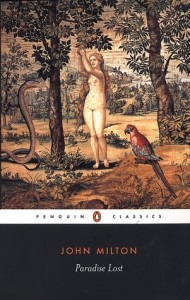I saw a tweet last week that made me very excited. At the risk of exposing the English Lit nerd in me, I was very happy to see this USA Today article that announced Bradley Cooper would be starring as Lucifer in an upcoming Paradise Lost movie.
 Paradise Lost, people! The Milton epic poem that tells the story of Lucifer being cast down into hell after the war in heaven, and his subsequent temptation of Adam and Eve. I can’t wait to see if Bradley Cooper will be as good in the part as I think he’ll be.
Paradise Lost, people! The Milton epic poem that tells the story of Lucifer being cast down into hell after the war in heaven, and his subsequent temptation of Adam and Eve. I can’t wait to see if Bradley Cooper will be as good in the part as I think he’ll be.
If you haven’t read the poem, the most startling thing about it is how the character of Lucifer is portrayed. He’s compelling and sympathetic, and actually comes across as a hero. You find yourself understanding him and relating to what he has to say. Well, in the beginning anyway. All that changes when the story moves on to Adam and Eve. That disappointed me when I first read it – how Lucifer seemed so three dimensional at the beginning of the story, but became more one-dimensionally evil by the end. I suppose that was inevitable given the time when Milton was writing.
I really do recommend reading the original poem, but if the idea of reading a poem that is 12 “books” (really parts) long makes you go, “Hell, no!”, I found a truncated, hitting-the-highlights version on Wikiquote here.
I’ll leave you with a couple of quotes that will probably seem familiar to many of you. They come from the opening, when Lucifer is trying to console his followers (he’s rallying the troops, really) who have been cast down from heaven with him, and now find themselves in a much darker place.

The mind is its own place, and in itself
Can make a heav’n of hell, a hell of heav’n.
– Book I, lines 254-55
we shall be free; the Almighty hath not built
Here for his envy, will not drive us hence:
Here we may reign secure, and in my choice
to reign is worth ambition though in Hell:
Better to reign in Hell, than serve in Heaven.
– Book I, lines 258-63
